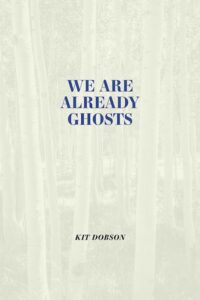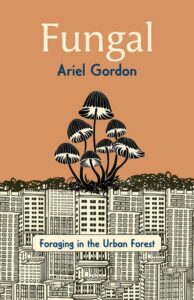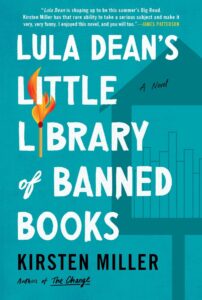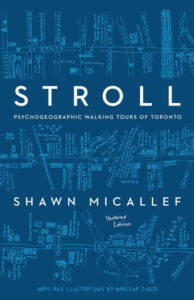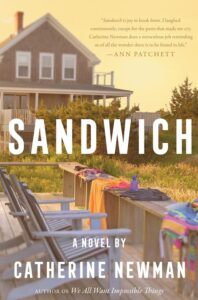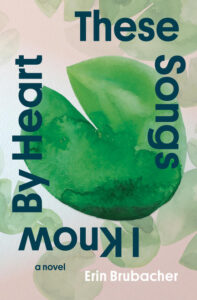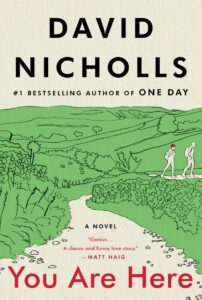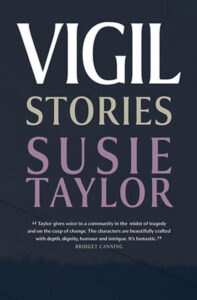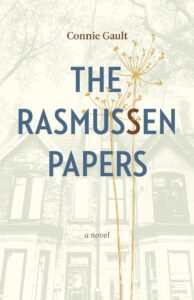August 1, 2024
SHARK HEART, by Emily Habeck

One of my most frequent experiences of nostalgia is biblio-nostalgia, the longing to be returned to a particular book in a time and place that felt especially sublime. The August I read MALIBU RISING at a rented cottage and could not put it down, the long weekend two years ago when I read Jennifer Close’s MARRYING THE KETCHUPS at the beach, the particular camp chair I was slumped in years ago as I was hastily turning the pages of Amber Dawn’s SODOM ROAD EXIT (lesbians, vampires and abandoned roller coasters on the shores of Lake Erie, oh my!). And yes, while it’s only been a month, I’m still not over having read Shelby Van Pelt’s REMARKABLY BRIGHT CREATURES on our camping trip over the Canada Day long weekend and—especially as we departed on another camping trip last Saturday—I felt the desire to have it happen all over again, the perfect book in the perfect place and time. But this is the kind of experience it’s impossible to manufacture; it either happens or it doesn’t.
But it did, because en-route to our campsite on the banks of Lake Huron, we stopped for in the town of St. Marys, precisely because it was home to a bookshop I’d never visited before, Betty’s Bookshelf, and the town turned out to be wonderful, the bookshop itself just absolutely perfect, stocked with excellent picks (including my own novel!), and every single member of my family left with a title we’d never heard of before.
Which for me was SHARK HEART, by Emily Habeck, enthusiastically recommended by bookseller Wren, a book that MIGHT have been a hard-sell considering its premise (this is a novel about a newlywed couple whose plans go awry when the male partner is diagnosed with a rare disease in which he mutates into a great white shark, yup, really), but Wren promised me that this was a novel about love, and grief and life, and the mutation is a metaphor of sorts, and then I read the back and saw a blurb by none other than Shelby Van Pelt, and decided that this might be the closest I’d come to reading REMARKABLY BRIGHT CREATURES for the first time all over again.
I will say that this is a very different kind of book, far more strange and lyrical, if similarly preoccupied by the desires of sea creatures and blurry lines between us and them, but it similarly hit just perfectly, and as I devoured it (I sound like a great white shark now; it was less bloody than that, I promise). Like Ann Patchett’s TOM LAKE, it’s also about a production of OUR TOWN, which I’ve now even read. This is a novel about the paths in life that take us places where our loved ones can’t follow, about how to face the unimaginable, about how some people are unlucky over and over, terrible patterns repeating, the unfairness of fate, the beauty that’s possible anyway.
I loved it. You should read it. Thank you to Betty’s Bookshelf’s Wren.
July 23, 2024
We Are Already Ghosts, by Kit Dobson
Imagine—structurally speaking—To The Lighthouse a century later, Woolf’s modernist masterpiece transposed from Cornwall to rural Alberta, the story of a family cabin, a summer idyll, one precious week a year in which time appears to stand still and nothing ever changes. Except, of course, the children are growing, and parents get older, marriages end and new loves begin, and babies are born, and people die, and all of this flurry of action—in Kit Dobson’s cerebral and tremendously moving first novel WE ARE ALREADY GHOSTS—takes place in the “corridors” between the narrative’s main sections, each corridor spanning a five year gap that brings us back again to the cabin that once belonged to Clare’s parents, where now she comes with her own family and those of her husband’s brothers. The novel begins in 1996 and returns us—at five year intervals—to the family at this place so removed from the world, and yet part of it enough that the world creeps in, and I’m thinking about the attraction of summer places like these, the places we return to, the illusion that anything can ever stay the same, or that any of us might outwit the human condition of being mortal, and how the reality of the matter can shock us every time. GHOSTS is an enveloping story of love and family, of parenthood, and also time, and CanLit tropes, and war, and history, and bears at the dump, and what it means to live on stolen land, and everything that’s eternal, and everything that isn’t, and I loved it all so much.
July 15, 2024
FUNGAL, by Ariel Gordon
Ariel Gordon is my favourite force of nature, a poet and essayist whose enthusiasm is a chief characteristic, matched only by her abundant generosity and community spirit. A spirit that extends to trees, as reflected in her previous essay collection Treed: Walking in Canada’s Urban Forest, and now mushrooms in her latest, Fungal: Foraging in the Urban Forest. Which is a book about seeing, and looking and finding, and making connections (another item in the Ariel Gordon skill set—in 2020 I ran a series at 49thShelf featuring brand new books with their authors and Gordon was cited as a mentor/supporter/champion/inspiration over and over again, when most other figures didn’t turn up twice), and taking wild leaps. My favourite part of the book (or maybe the part that most resonated) was when Gordon makes a soup from foraged verpas and is torn between a fear of poisoning herself and her aversion to food waste (spoiler: the latter wins. And Ariel lives). An essay collection about mushrooms, it turns out (no surprise, like essays about trees) is an essay collection about everything, about family life, riverbank explorations, about the TV series Hannibal, about mushroom kitsch, about not doing shrooms. Gordon meets other Winnipeg mushroom enthusiasts. She learns to grow her own mushrooms. She receives mushroom stuffies in the mail. She gets a job in a mushroom factory actually harvesting mushrooms. She feeds her book Treed to fungi, which grows mushrooms, which she gets to harvest and literally eat her own words. She collects mushroom lore, mushroom books. She speaks to Ukrainian immigrants whose own mushroom traditions can be replicated on the prairies. She sits in poison ivy, has to remove so many ticks, drives her car so far off-road in search in morels that the CAA won’t cover her towing-job, and these essays are foraged from all these adventures, all of them a fascinating delight to behold.
July 4, 2024
Lula Dean’s Little Library of Banned Books, by Kirsten Miller
‘”I think of every bouquet as a little story,” Betsy told her, “and stories are the most powerful things in the world. They can mend broken hearts, bring back good memories, and make people fall in love.”
“Or convince them to do the right thing,” Nahla added.
Betsy Wright shot Nahla a look. “Sometimes. But the trick is getting to know people well enough to tell their stories. You can’t just assume you know what they’re like. You have to pay attention. You got to watch and listen.”‘
Kirsten Miller, born and raised in North Carolina, follows up her bestselling The Change (which I LOVED!) with LULA DEAN’S LITTLE LIBRARY OF BANNED BOOKS, set in the fictional town of Troy, Georgia, home to a Confederate statue, a savvy postman, an elderly lawyer whose family are intent on her inheritance, and many other colourful characters, Lula Dean among them, who has organized a committee to remove “controversial” titles from school libraries, books considered corrupting for children, books about things like menstruation, gay people, the Holocaust, racism, history and rape. To promote her message, Lula Dean erects a little free library on her property and fills it with what she considers more suitable titles. The novels begins when somebody switches the books in Lulu’s library with the books she’s banned, but keeping the dustjackets so the titles appear innocuous. And as those contested titles make their way into the community, radical things start happening, dangerous things start happening, all of this underlining the power of books to shape the story of who we are, where we’ve come from, and where we’re going.
“I want to make it perfectly clear,” Miller writes in her Author’s Note, “that the issues addressed in this novel—book banning, white nationalism, anti-Semitism, etc.—are by no means unique to the South, These are American problems. Pretending the only occur in the South has allowed them to flourish unchecked elsewhere in the United States.” And so for the 4th of July, I bring you this funny, edgy and altogether timely novel, though I’m not sure the people who really need to learn its message will be the ones to pick it up. Maybe we need to switch up the cover with that of a novel by Newt Gingrich…
June 27, 2024
STROLL, by Shawn Micallef
Toronto’s St. Anne’s Anglican Church—lost to a devastating fire on June 9—was a sacred space, but not necessarily for the fact of it being a church, and I was thinking about this as I took in the widespread grief people were feeling in the aftermath, surprised too by the weight of my own grief. I am not religious, I don’t live near St. Anne’s, its iconic dome never factored into my personal cityscape, but I’d been inside the church once, years ago, when it was home to the Brockton Writers Series, and the experience was awe-inspiring, unforgettable. I’d also dropped at least one of my children for Girl Guides at the nearby Parish Hall, and I think it’s this element of community, of openness and accessibility, in addition to the treasures of its art and architecture, that made St. Anne’s a sacred space. The fact too of such an extraordinary building in a pretty ordinary setting—at the end of a row of houses in a residential neigbourhood, across the street from a chocolate factory.
The Ontario Science Centre—abruptly closed last week by a government that’s never earned our trust—is not so different, and public outcry at this loss has been just as intense. A centennial project built in a Toronto suburb by one of Canada’s most famous architects, the building is a testament to progress and technology, to the benefits and necessity of science education. I was last there three weeks ago as chaperone on a school trip, and as we rode the escalators up through the ravine—cardinals, redwing blackbirds and sparrows—I was as awe-struck as I’d been in the St. Anne’s sanctuary. Like St. Anne’s, there is nothing else like it, and to imagine it to be replaceable, even disposable. I can’t fathom the lack of vision required for that.
But maybe all places are a little bit sacred, places where people go and people are. Places which are homes to our memories, our stories, proof we cling to of some kind of solid foundations in the whirlwind of time.
And what a whirlwind it is!
I bought the updated edition of Shawn Micallef’s STROLL five weeks ago, and was not expecting to read it cover-to-cover. I thought it might be more aspirational, that it would be good company on walks I’d be unlikely to take, but then I started reading, and I didn’t stop. A walk a day. And while it’s still unlikely I’ll ever venture on a hike from Sherway Gardens, I’m curious now, and I’ve already made a trip to Bathurst and Lawrence inspired by Bathurst Walk. I especially enjoyed the walks about areas that are already familiar to me, deepening my connection to my own local geography, but I just as much loved reading about walks in places further afield, neighbourhoods with names like Bendale, West Hill, Willowdale, or the spot in the north of the city that, Micallef declares, brings him, “as close as I’ve ever come to feeling like…William Wordsworth, [wandering] through the rural Lake District in England.”
Cities, as Micallef knows, are never static, are layer upon layer of history and meaning, and his wild connections are my favourite part of the text: “When CHUM’s tight rotation allowed them to play Bowie’s ‘Rebel, Rebel,’ it would’ve been easy to pretend it was an homage to William Lyon Mackenzie’s rebel forces, whose advance was stopped here in 1937.” Or, regarding the O’Keefe Centre, which hosted Mikhail Baryshnikov following is 1974 defection from the Soviet Union: “That Cold War drama was able to play out down here because Victorian-era Torontonians decided to extend the city south of Front Street, where the original shoreline of Lake Ontario was located.”
Apart from a few exceptions (that North York trip for lunch at the United Bakers Dairy Restaurant), I’ve not yet gone far out of my way to partake in one of Micallef’s strolls, but reading the book has already changed the way I see my usual circuit. A trip to Harbourfront two weeks ago had me noticing how buildings around the ferry docks turn their backs on the city, because when they were built in the 1970s, there was very little city immediately for them to see. I saw the Gerrard Street gates to Chinatown on a streetcar journey up Broadview Avenue on Sunday, something I’d never noticed before. The way he writes about Dupont Street, “As with the servant’s side of a British manor house, things get taken care of on Dupont: it’s a working street that keeps the prettier parts of the city running.”
Even Dupont Street is sacred if you quint.
June 25, 2024
SANDWICH, by Catherine Newman
On Sunday night, the evening before my 45th birthday, which is “halfway to 90,” as my youngest child keeps noting, that very same child’s tooth fell out, an occasion that was once momentous in our household, but has ceased to be. I ended up breaking a ten dollar bill with coins from her piggy bank in order for the tooth fairy duties to be fulfilled, and it occurred me that it won’t be long now before my tooth fairy days are behind me, which felt especially poignant since I was in the middle of Catherine Newman’s Sandwich, a novel that is both a beach read about a Cape Cod family holiday and an exploration of the “reproductive mayhem” that is the female experience. Told from the perspective of Rocky, stuck between love and obligation to her elderly parents and her just-grown kids, all of whom have joined her and her husband at the cramped seaside rental as she grapples with hot flashes and menopausal rage, and long-hidden secrets come back to the surface.
“Life is a seesaw, and I am standing dead center, still, and balanced: living kids on one side, living parents on the other. Nicky here with me at the fulcrum. Don’t move a muscle, I think. But I will, of course, You have to.”
This is a novel about the enormity of human experience, about ideas that are terrible, heavy and monstrous—the Holocaust, the Patriarchy. It’s about miscarriage, and death, and something called “vaginal atrophy,” and the fragile nature of the human heart, literally and otherwise. It’s about how to love is to lose, eventually, and how far away the overwhelming experiences of early parenthood (experiences that Newman documented in her own popular blog back in the day) eventually becomes, which seems impossible when you’re in it, and about the delights and frustrations of adult children, and the heartache of seeing one’s parents get old. And it’s all so fun, and so breezy, like your best friend is writing you a chatty letter (like a blog), you’ll even laugh, just as you will likely cry, and that balance is a seesaw too, and Newman gets it exactly right.
“It’s so crushingly beautiful, being human… But also so terrible and ridiculous.”
June 5, 2024
These Songs I Know By Heart, by Erin Brubacher
“Enthusiasm is actually the most important gift,” is a line I underlined in THESE SONGS I KNOW BY HEART, the debut fiction by multidisciplinary artist Erin Brubacher, which I think is true, and also might be why this book shone for me in a way that other autofiction usually doesn’t—though how would I know, really, considering that I almost never read it? But when I think about autofiction, I think of characters who are cool and detached, bored and languid—watch the me who is also not me while I lounge on a chair and do nothing—and so I rarely think about autofiction at all, but this book was different, vulnerable and earnest, about collaboration, about creation, the work of creating community, of creating a family that is part of a community, about friendship, and rituals, and all the acts that infuse our existence with meaning. The narrator is enthusiastic, that gift. She feels things, she wants things—which also means that sometimes she doesn’t get what she wants, or she loses what she has. Though what she really wants is a camping trip in Algonquin Park with her friend Alice, and much of the first part of the novel finds her there, reading and thinking and planning; hanging Alice’s lily-pad paintings up on the line with clothes pegs. The narrator spends a lot of time ruminating on her friendships, her connection to her ex-husband, her connections to strangers, her connections to the children in her life.
And then the narrative zooms out a bit, and back in time, and we learn the camping trip is situated during the uncertain summer of 2020, Brubacher telling the stories of the months leading up to it, the context, the narrator moving into a new home with her partner and stepchild, beginning the processes of IVF, her big beautiful world of art and company made tiny when the world shuts down in March. (“We’d managed to come up with the worst possible staging for the moment: the audience and performers were to be seated right next to one another…with a 150 person choir occupying the seats around the perimeter of the crowd, singing at them…. I’m levelled by the idea that, in this moment, a choir is the most dangerous thing… Everything in me wants to fight for the choir. I’m trying to figure out what that might mean, to fight for the choir.”)
Enthusiasm is a gift, and so too is this novel, which is steeped with enthusiasm, passion and feeling for extraordinary ordinary things, which is fighting for the choir.
June 3, 2024
You Are Here, by David Nicholls
Okay, I think I did read David Nicholls’ novel US, though I don’t remember it, but I do remember seeing his novel SWEET SORROW in the window of Palmerston Library in 2021 when the library was closed to patrons but we could point to items in the window and staff would bring them to us at the door and the set-up was a bit speakeasy, and I’d only selected the book because the cover was pool-blue and at first glance the two figures are floating in the water, except that they’re wearing clothes and reading books and it turns out this isn’t a swimming book at all, but I loved it anyway, SO MUCH, and its rich emotional tapestry was still on my mind when I decided to pre-order Nicholls’ new book, YOU ARE HERE, plus Katie Clapham had written about it, explaining, “David Nicholls writes the romance of reasonable people, and that’s very sexy to me.”
She also wrote: “Sometimes things are popular because they’re excellent. Sometimes the experience eclipses the hype. Sometimes you should just buy the new book from the number one best selling author of global sensation One Day and sometimes, only a David Nicholls novel will do.”
And I think she’s right. I read YOU ARE HERE this weekend, and adored it, and was also put through an emotional wringer, laughed out like a lunatic, and temporarily through that walking England coast-to-coast might be something that I want to do (and then I changed my mind).
It’s the story of Marnie and Michael who are connected by a meddling friend who is trying to set each one up with somebody else, and the two end up on a walking trip together, both forced by the meddling friend into breaking out of post-pandemic malaise and isolation. Both are divorced, Michael freshly, Marnie otherwise, and both bring four decades of life lived to the present moment, to their complicated and gorgeous textured connection, the chapters moving back and forth between their different points of view, the particular circumstances in which they find themselves leading to real vulnerability and introspection and epic cock-ups and misunderstandings, and kissing, a brush with death, and chance for both at happiness again. “Even with her sore eyes and hot, aching head, she felt that time was passing quickly and lightly and that a real summer, the first for many years, lay ahead.”
May 29, 2024
Vigil, by Susie Taylor
If you think you know Newfoundland writing, then you need to know Susie Taylor, who has followed EVEN WEIRDER THAN BEFORE, her sparkling queer coming-of-age debut, with VIGIL, a book that’s even better, though it doesn’t sparkle so much as tremble, quake, and explode. It’s a collection of interconnected stories (and I’m going to declare it, don’t @ me) each of which really is a stellar example of the form, but the collection also properly satisfies the requirements of a novel, set against the fictional Newfoundland community of Bay Mal Verde, a place on the margins of geography, about people on the margins of society, their lives rattled by poverty and addiction. They’re tragic, but also funny, and familiar, the question of what happened to Stevie Loder at the centre of the plot. The title story opening the collection, about the impromptu memorial at the Ultramar after Stevie goes missing (“Someone had stuck a whole untouched Happy Meal on the growing pile of tributes…and the gulls swarmed the thing.”) Stevie is something of a perpetual loser (I wrote “something of” so I’d seem more compassionate), a scrawny kid who gets knocked around by the world, including his father and his friends, and grows up for more of the same, the story of his disappearance unravelling as the collection unfolds, connected to the respective narratives of characters including Joseph the garbage man, who runs a drug dealing empire, and the people in his employ, including local thug Kev Babcock, who we come to have sympathy for—but is Stevie so expendable? Perhaps. There is Ryan, who was friends with the other boys, but had a route out of town via university, which means that encountering him later in the story is gutting. Carter, whose practical younger sister is also drawn to Kev, but who (thankfully) is smarter than he is, and a meta kind of character called Susie, “that running girl,” who is not from Bay Mal Verde, but arrived in town with her girlfriend, drawing suspicion from that, but she’s alone now, running the trails and narrowly skirting danger, reporting what she sees (except for a pivotal moment when she doesn’t).
The stories in Taylor’s Vigil are a chorus, and they make a song that soars, the bleakness of their concerns offset by the vitality of the voices, and the shimmering moments of redemption woven like miracles throughout the text.
May 28, 2024
The Rasmussen Papers, by Connie Gault
“How strange it is that our lives are not usefully taken apart, not instructive in their compartments, but everything in one life is twisted inextricably with everything else, and it’s impossible to decipher it all.”
What a fascinating, sly, and tricky novel is Connie Gault’s THE RASMUSSEN PAPERS, Alissa York’s blurb conjuring the image of a fox with a quicksilver tip to its tail, and that’s it exactly. An urban fox, of course, out of place, slipping along the sidewalk and disappearing down into a ravine leaving no trace, as though it had ever been there. Like Gault’s unnamed narrator, an essayist hoping to write a biography of the iconic but enigmatic Canadian poet, Marianne Rasmussen, who concocts a plan to rent a room in the home of Aubrey Ash, on the cusp of his one hundredth birthday and Rasmussen’s former lover. Once ensconced, the narrator hopes, she will find her way to Ash’s papers and finally undercover the mysteries and crack the code of Rasmussen’s most famous work—but all this turns out to be more complicated than she’d supposed.
Who IS the fox, after all? Is it our unnamed narrator, or Aubrey Ash himself? Ash’s attractive much-younger brother, whom the narrator is drawn to? Is it the cocky young literary critic whose many affectations include a cravat, who—inadvertently or otherwise—sets the narrator’s plan in motion? Is it the patriarchy, the oldest of old boy’s clubs? Or the city of Toronto and its seedy downtown east side, desperate people parked in doorways or screaming expletives on public transit, something scrambled in their brains, perhaps, or maybe they just see everything more clearly than the rest of us.
I loved this novel, which reminded me of Carol Shields in the very best way—imagine the preoccupations of her novels Swann and Unless. About the problems of biography, literary mythology, women writing, bystanding, and the impossible challenges of giving form to the world and to life itself.
